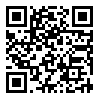Volume 6, Issue 4 (1-2026)
JFCV 2026, 6(4): 0-0 |
Back to browse issues page
Download citation:
BibTeX | RIS | EndNote | Medlars | ProCite | Reference Manager | RefWorks
Send citation to:



BibTeX | RIS | EndNote | Medlars | ProCite | Reference Manager | RefWorks
Send citation to:
Firoozpour A, Ghalambor M A, Zolfaghary Y. The Future of Governance in Tehran: Identifying and Ranking Key Factors. JFCV 2026; 6 (4)
URL: http://jvfc.ir/article-1-456-en.html
URL: http://jvfc.ir/article-1-456-en.html
1- University of Tehran
2- Ahl al Bayt International University ,Ghalambor@abu.ac.ir
2- Ahl al Bayt International University ,
Abstract: (1238 Views)
In recent years, the accelerating pace of environmental changes, evolving citizen demands and expectations, and the inefficiency of traditional urban management systems have underscored the necessity of transitioning toward effective urban governance systems as a prerequisite for achieving sustainable urban development. In this context, contemplating the future of cities and establishing a desirable governance system will not be feasible without acquiring a comprehensive understanding of the influential components and key drivers shaping the future of urban governance. To this end, this study aims to identify and rank the key factors influencing the future governance of Tehran. Initially, by employing an environmental scanning process and comprehensively monitoring trends, events, and forces impacting Tehran's urban governance, 87 factors (after eliminating duplicate and insignificant elements) were selected as the primary components of the research. For categorizing these trends and driving forces, the "Six-Sector Approach" was utilized. This approach, widely applied in urban studies, classifies the examined components and trends into six domains: socio-cultural, demographic, economic, environmental, governance, and technological. In the next stage, the identification of key components was conducted through an assessment of their importance-uncertainty using a questionnaire tool and expert evaluations. Ultimately, after analyzing the importance-uncertainty matrix, 14 key factors were identified as the most influential elements shaping the future governance of Tehran. The research findings indicate that factors such as citizen trust in governance institutions, conflicts of interest between public and private sector actors, technological advancements, knowledge-based economy, citizen participation, and environmental issues will have the most significant impact on Tehran's future governance.
Send email to the article author
| Rights and permissions | |
 |
This work is licensed under a Creative Commons Attribution-NonCommercial 4.0 International License. |





